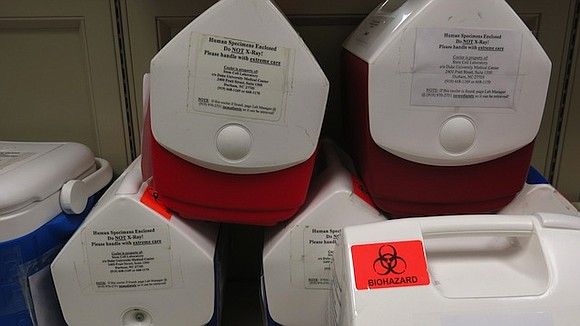Stem Cells Offer Hope for Autism
CNN/Stylemagazine.com Newswire | 4/28/2017, 11 a.m.

Story by Wayne Drash and Dr. Sanjay Gupta, CNN Video by Michelle Cohan
Dr. Joanne Kurtzberg shows off a freezer deep inside the bowels of the Carolinas Cord Blood Bank at Duke University Medical Center. Known as a thermogenesis freezer, it stores up to 3,640 units of cord blood -- left over from babies' umbilical cords and placenta -- at minus 196 degrees Celsius.
Each unit is designated by labels with specially designed adhesive to withstand extremely cold temperatures for decades. There are 14 cord blood freezers in all.
It is the cord blood in those freezers -- stored or donated by parents in case a serious illness develops -- that's at the cutting edge of this research.
Kurtzberg, who heads the Robertson Clinical and Translational Cell Therapy Program, has teamed up with Dr. Geraldine Dawson, director of the Duke Center for Autism and Brain Development.
Both saw a great need for medical advances to help treat children with autism. An estimated one in every 68 children in America has some form of autism spectrum disorder, according to the Centers for Disease Control and Prevention.
About 30% never learn to speak, and many children even with early behavioral interventions still struggle to adapt. There also are no FDA-approved medications that improve the core symptoms of autism.
"I was very interested in collaborating with people here at Duke who could offer medical approaches that could enhance neuroplasticity, or the brain's ability to respond to treatment," Dawson says.
That's where Kurtzberg comes in. Over the past two decades, she had seen children with inherited metabolic disorders be treated with cord blood after receiving high doses of chemotherapy.
"We've been able to show that with some of these diseases, a cord transplant rescues them from death and also improves their neurologic outcome," she says.
She began wondering: Could cord blood help other children?
About a decade ago, her laboratory began clinical tests of children with cerebral palsy whose parents had banked their cord blood. Again, they saw positive results. And in some of those children who had autistic tendencies, they saw autistic symptoms improve. Another spark went off: What if they tested cord blood specifically for autism?
The safety trial began a little over a year and a half ago. Not only did it find cord blood to be safe, but 70% of the 25 children, age 2 to 6, had behavioral improvements as described by their parents and tracked by the Duke researchers. The research is largely funded by a $40 million donation from the Marcus Foundation, a nonprofit created by Home Depot co-founder Bernie Marcus.
The children traveled to Duke three times over the course of a year. They underwent a series of evaluations such as autism assessments, MRIs and EEGs to track their brain activity. On the first trip, the children received the cord blood infusion along with the intense evaluations. Each child received 1 billion to 2 billion cells, given through an IV in their arms or legs. At six months and then a year later, the children returned for more tests and observations.
"Some children, who were not speaking very much, had big increases in their vocabulary and their functional speech," Kurtzberg says. "Many children were able to attend to play and have meaningful communication in a way that they weren't before. Some children had less repetitive behaviors than they did when they came onto the study."
Adds Dawson, "The study was very encouraging. We did see positive results. However, it did not have a comparison group, which is very important in establishing whether a treatment is actually effective."
Both researchers can't stress that enough: that although they're cautiously optimistic about the results, they want the science to play out. They are now in the midst of the definitive trial on whether cord blood can treat autism -- a double-blind, placebo-controlled trial involving 165 autistic children, ranging in age from 2 to 8. The FDA has oversight of the study.









